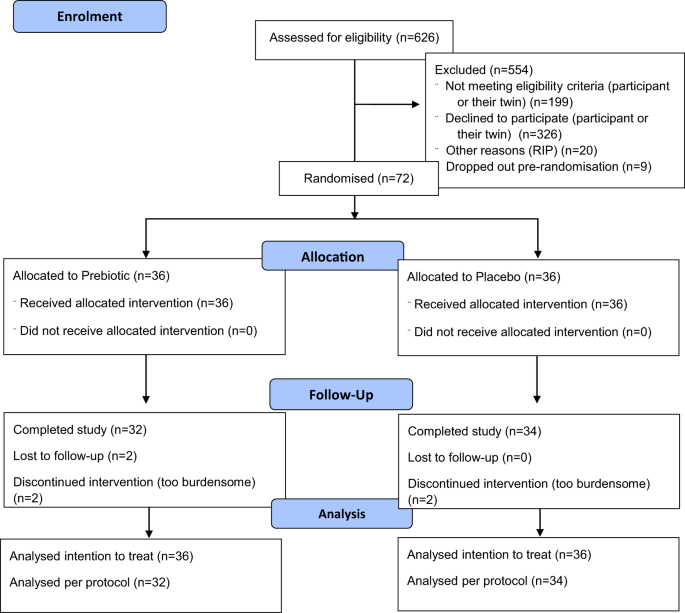📍 Ageing is associated with increased frailty, cognitive decline, and changes in muscle physiology. The gut microbiome has emerged as a potential player in influencing both muscle and cognitive health. This report summarizes the findings of a placebo-controlled, double-blinded, randomized trial conducted on 72 individuals aged ≥60, investigating the impact of a prebiotic supplement on muscle strength, physical function, and cognition in older adults.
📍 Methods:
– Study Design: Placebo-controlled, double-blinded, randomized trial of 36 twin pairs (72 individuals).
– Intervention: Prebiotic supplement or placebo daily for 12 weeks, alongside resistance exercise and branched-chain amino acid supplementation.
– Outcome Measures: Physical function (chair rise time) and cognition (various tests), assessed remotely via video visits, online questionnaires, and cognitive testing. Biological samples and equipment were sent to participants.
– Gut Microbiome Assessment: Changes in gut microbiota composition and function evaluated through metagenomic analysis.
📍 Findings
1. Muscle Strength and Function:
– No significant improvement in chair rise time (a proxy for muscle strength) with prebiotic compared to placebo.
– Secondary outcomes, including hand grip strength, Short Physical Performance Battery (SPPB), and physical activity (IPAQ), showed no significant differences.
– Limitations: The 12-week intervention might be insufficient for muscle remodeling, and the study may have been underpowered.
2. Cognition
– Prebiotic supplementation significantly improved cognition compared to placebo, as assessed by a cognitive battery.
– The improvement was noted in the Paired Associates Learning test, emphasizing visual memory and new learning.
– The gut-brain axis may play a role, supported by a growing body of evidence suggesting microbiome interventions can enhance cognition.
3. Gut Microbiome:
– The prebiotic induced significant changes in gut microbiota composition, with increased relative abundance of Actinobacteria, particularly Bifidobacterium.
– Alpha diversity reduced, aligning with previous prebiotic studies.
– Some taxa changes were heritable, reinforcing the impact of genetics on the gut microbiome.
– Correlation found between gut microbiome features related to amino acid and carbohydrate metabolism and physical ability.
4. Feasibility of Remote Trials:
– The remote trial design proved successful, demonstrating feasibility for older adults with good adherence and substantial data collection.
– Side effects were noted but did not affect compliance, highlighting the acceptability of the intervention.
📍
– The trial provides evidence that a 7.5 g/d dose of prebiotic is sufficient to induce gut microbiome changes.
– No improvement in muscle strength suggests a need for longer intervention periods and consideration of alternative prebiotics.
– Cognitive improvements warrant further investigation with larger studies, diverse cognitive tests, and detailed microbiome measures.
– The gut-brain axis may be implicated in cognitive enhancements, emphasizing the need for future research.
📍 Strengths and Limitations
– Twin pairs design enhances baseline matching and reduces confounding.
– Remote trial design is a strength but may exclude digitally illiterate participants.
– Lack of mid-study gut microbiome samples limits insights into recovery from prebiotic intervention.
📍 While prebiotic supplementation did not enhance muscle strength, it significantly improved cognition in healthy older adults. The study highlights the potential of gut microbiome interventions in cognitive frailty and the feasibility of remotely delivered trials for older populations. Future research should explore alternative prebiotics, longer intervention periods, and diverse cognitive assessments to deepen our understanding of the gut-muscle-brain axis in ageing.
Link to the article : https://tinyurl.com/2s9adzux
